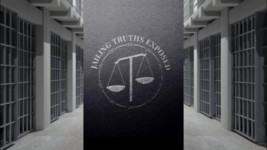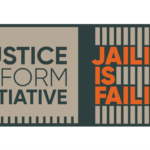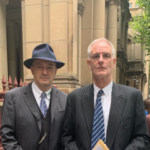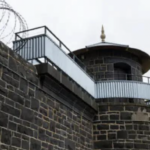Corrective Services Is Failing Us All: An Interview with Jailing Truths Exposed’s Joanna Scriven

Jailing Truths Exposed started as a Facebook group in 2021, but such was the response to it, that it’s transformed into a prisoners’ rights organisation, that’s now calling for an overhaul of the NSW prison system, as it’s not providing any rehabilitative service, but rather it’s creating societal trauma.
So jaded is the view of prisons in the state of NSW, which itself commenced as a penal colony, that the idea that someone who has broken the law might be transformed in a positive manner during their time inside, and hence, in a way that benefits society, sounds a little naïve these days.
Yet, as Jailing Truths Exposed founder Joanna Scriven points out, what might just be an idea in NSW, actually exists in the Scandinavian countries, as, in going to prison over there, people are treated like humans. They’re rights are upheld. And they leave in a better state than when they entered.
The prison systems in Norway, Sweden and Denmark have much lower recidivism rates than over here. And while the prisons in these European nations don’t completely rid society of crime, they do release people in a manner that benefits the entire community, including the former inmate.
Inconvenient truths revealed
Jailing Truths Exposed sent a letter to NSW corrections minister Anoulack Chanthivong in February, requesting a meeting, yet he hasn’t replied. Although one can expect that, as the majority of the NSW constituency has grown rather cynical about prisons, that he too likely shares these opinions.
Within the state of NSW, people understand that corrective centres are harsh places, where the need for profit of the ever-growing private prison sector creates even nastier conditions than state-run institutions, and those who go in are expected to come out damaged and isolated.
The recidivism rate in NSW is around 49 percent, which means of those released into the community, almost half return to prison within two years due to reoffending. And on top of this, over 40 percent inside are on remand, meaning they’re either unconvicted or unsentenced.
Another stark reality of the NSW prison system is that 30 percent of adult inmates are First Nations people, and this figure is revealed to be disproportionate in the extreme when considering that Aboriginal and Torres Strait Islander people only make up 3.4 percent of the overall state populace.
Reforming on the inside
Scriven points to the use of dynamic security in nations like Norway, which sees prison officers and inmates forming basic interpersonal relationships, whereby the two groups are no longer set up against one another, which promotes safety and makes it less necessary for staff to carry weapons.
JTE is also in contact with the University of California’s AMEND program, which is working with prisoners and staff to reduce the debilitating effects of the prison system, and it also has a focus on the promotion of prisoner health and an increase in officer training.
Sydney Criminal Lawyers spoke to Jailing Truths Exposed founder Joanna Scriven about the issues her organisation has raised with the minister, the benefits of taking a more humane approach to prisons and how NSW Greens MLC Sue Higginson appears to be the only one in parliament listening.
Joanna, can you tell us about what the issues with the NSW prison system are, as well as about how the Jailing Truths Exposed journey has happened?
Jailing Truths Exposed was the response to my son coming out of prison in 2018, more damaged than when he entered. He was released from Goulburn, when my father was dying, and because of the state of my son, I missed the last week of my father’s life.
On release, my son had erratic behaviour. He told me that I didn’t understand what he was going through. And at the time, I didn’t.
I was shocked by how quickly Jailing Truths Exposed grew. Members began sharing their experiences, which showed me that mine wasn’t an isolated case.
This led me to study a Certificate IV in Government at TAFE. I spent 18 months analysing how Corrective Services NSW is supposed to work, whilst looking at why it is not working.
One of the things that I found is that in comparison to Norway, where they have officers doing two years of theoretical and practical training, in Australia, people are only trained for six to eight weeks.
So, officers are not adequately trained, nor are they assessed for emotional intelligence: to show whether they would be suited to a role as a CSNSW officer.
An issue that we have in comparison with the system in Norway is that they train their prison officers to be social workers as well.
So, it is not just as simple as putting someone in a cage and not talking to them.
I studied the Norway principles a great deal during my research.
Prison officers here are reactive, rather than proactive. And based on December figures from the NSW Bureau of Crime Statistics and Research (BOCSAR), the number of people on remand in this state reached 5,055, which is the highest on record.
Those on remand made up 42 percent of adults in prison, which was up from 34 percent in 2019. This clearly shows that the state is continuing to incarcerate more people.
I’ve also got a list of issues that the Jailing Truths Exposed members have forwarded to me, which includes inmates on remand having no access to programs and services, and sentenced inmates often not having access to suitable programs either.
Inmates wait months to see a psychologist, a year for a dentist and must beg for medication, like paracetamol.
Despite other states taking time off sentences due to the impact of COVID, NSW did not.
Laundry is often not done for up to two weeks. Blankets are scarce. There are no alarms in Bathurst to alert staff to critical incidents, and when there are buzzers, officers often turn them off.
Inmates are often placed in cells with no running water. There is excessive use of solitary confinement. Inmate buy-ups are excessively priced. The Modern Slavery Act 2018 (NSW) is not upheld, and inmates are paid slavery wages.
Inmates don’t receive fresh food. They often eat old, rotten food. Phones cost $2.80 for 10 minutes to mobiles and $1.80 to landlines, while inmates work for about $1.50 an hour. A phone call can cost two hours work.
Medical emergencies are not responded to in a timely manner. This leads to deaths in custody.
We know from recent budget estimates that NSW corrections minister Anoulack Chanthivong has not read the CSNSW Code of Practice, as he doesn’t know what’s in it.
There is a continual breach of human rights. There has been a failure to uphold the Mandela Rules. The state has refused to let OPCAT inspect prisons. No one has been appointed to deal with the OPCAT incidents.
Officers are racist. The complaints mechanism is set up to fail. The only avenue of complaints that we know of is through NSW Greens MLC Sue Higginson. Workers leave the sector, and some even take their lives, as they see no way out of the toxic sector.
Corrective Services officers are often abusive and violent towards inmates. And they do not talk to them as if they are people.
From what I can see is that this is not an environment where crime can be corrected in, nor reform take place. That’s based on my own observations and those of my chief strategist inside, Jason Maloney, who is currently detained in Lithogow prison. From what we can see, rehabilitation is not possible.
In a letter sent to NSW corrections minister Anoulack Chanthivong in February, Jailing Truths Exposed requested a meeting to discuss a list of issues relating to the corrections systems.
What has the response been like?
We haven’t heard anything back. We are trying to bring to his attention the continued high statistics, which show that Corrective Services NSW is failing to rehabilitate individuals. Inmates are not reformed. Officers aren’t safe in the workplace.
We want to discuss a proper complaints system and an external review of CSNSW being undertaken. We want dynamic security training to be undertaken, as well as inmate accessibility to independent clinicians, First Nations inmate accessibility to elders and open consultation.
Issues in the NSW prisons system disproportionately affect First Nations communities, as whilst making up about 3 percent of the general population, they account for 30 percent of the adult prisoner population.
Can you talk about the impact of the NSW corrections system has on First Nations people?
Aboriginal Legal Services statistics speak volumes about First Nations inmates: 42 percent were receiving mental health treatment, 82 percent had a current drug issue, 33 percent had an issue with alcohol, 13 percent were diagnosed with active psychosis, 66 percent did not complete Year 10, 26 percent were in out-of-home care as a child, 39 had a first custody episode before 18, and 92 percent had a prior custody episode.
Gomeroi woman Gwenda Stanley, a representative of the Aboriginal Tent Embassy, says, “First Nations have been impacted by corrective services since 1788, with Australia being established as a penal colony.”
“The establishment of the NSW Police Force was in 1862. The police and policymakers have continued to ignore high incarceration rates due to biased attitudes.”
“Lack of appropriate health care in prisons knowingly that many First Nations people suffer from chronic illness, diabetes heart conditions and mental health issues.”
First Nation prisoners need healing and assistance with ongoing grief that is intergenerational. First Nations culture is not respected in the prisons.
They don’t have access to elders for support, unless they are incarcerated in the same centre. That is why we have that demand with the minister.
In 2021, Aboriginal and Torres Strait Islander Social Justice Commissioner June Oscar said, “For 30 years, we have urged Australian governments to implement all the recommendations made by the Royal Commission.”
“We have long held the solutions, and countless inquires and reports have given us the way forward. But time and again, we fail to effectively implement them, and as a result we continue to see First Nations men, women and children dying in our so-called justice system.”
This is a similar theme across the whole prison sector. That is why I have asked for international input from AMEND and from David Prescott, because I’m resolved to the fact that Australia doesn’t know how to run our corrective services.
This is obviously impacting more vulnerable populations, such as First Nations people, who have a high-level of need and a high-level of intergenerational trauma.
Another unexpected aspect to Jailing Truths Exposed is that prison officers have reached out to the group regarding issues they’re concerned with relating to the criminal justice system.
What sort of issues have guards been raising?
Prison guards, when they make complaints, get targeted and bullied themselves. There are a number of issues that ex-prison officer Louise Harris has raised, which have included the way officers get treated when they make complaints.
We also have a complete lack of what is called “dynamic security” in NSW. The UN has a teaching handbook on it. It is one of the things the Norwegian system holds fast to.
Dynamic security is as simple as officers having communicative relationships with inmates. So, they know who they are, what their risk factors are and what their criminogenic needs are.
Largely, there is a big division between the two. So, we have officers operating as undertrained, overpaid guards that are not supported by their own union if they want to do the right thing.
Jailing Truths Exposed has recently led to the formation of New Directionz, which is a support service for post-release inmates. How does this program operate? Why is it needed?
New Directionz meets with inmates by way of referral, or by way of appointment with Just Connect, which then refers them to our intake director Lisa Mathews, who arranges a time for an assessment meeting.
Basically, we need a solid commitment from them to turning their lives around.
We’re in contact with Professor David Prescott. He’s an American that went to Norway. He’s part of a group called Safer Societies, and they offer ongoing training to prison officers. And we have every intention of tapping into that as well.
For me, it was a matter of knowing how to redirect lives, and if the sector is not ready to do that, then we need to be working with people when they are coming out of prison.
So, we’re needed because currently there is no help for people leaving custody. At a budget estimates hearing in November 2023, the then CSNSW commissioner Kevin Corcoran was asked by me through Sue Higginson, as to whether he knew where inmates go after leaving prison.
His answer was they don’t know, but they’re working on it. They have pretty much palmed it off. They admitted they don’t know where prisoners go on release.
I’ve met ex-inmates on the streets of Sydney, who have highlighted to me that it would be easier for them to commit crime and go back to gaol, than to battle it out with no support, nowhere to go and with no supplies to live.
They’re actually hitting a brick wall. There is nowhere for them to go.
Jailing Truths Exposed was protesting out the front of the Corrective Services NSW Sydney offices last week, and the group has more actions planned.
So, Joanna, what do you foresee for JTE heading into the future? What are you trying to achieve through these actions?
We want to educate the public about what’s really going on under the guise of corrective services, and what a waste of taxpayers’ dollars it actually is.
We want to see the sector held to account for their failure to keep the community safe, and they’re failure to reduce recidivism or ongoing deaths in custody.
We want more training for officers, and the introduction of dynamic security in prisons. We want the sector to work with AMEND and David Prescott.
AMEND is an international program created by experts and officers in collaboration with Norwegian corrective services to address the culture within the sector.
Addressing the culture in prisons, transforms the very environment of what a correctional centre actually is and sees inmates released as contributing, safe members of society.
Norway has a reintegration guarantee.
We believe that inmates should be released into society, knowing that they’re capable of being functional, contributing members of society, not releasing them knowing they’re going to go back to crime and thereby create more victims.







